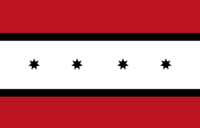The Troubles
The The Troubles (Terranilian: Sen Koisten), also known as the Modern Terranihil conflict, is an ongoing conflict in Terranihil which began in the 1970s. Although the conflict has been concentrated in a few major cities, the violence has spread throughout Terranihil, Póniepa, Lyoa and Malgax. The conflict is mostly fueled by religious differences between atheists, Muslims and Christians, though there is also an ethnic aspect.
The National Progressive Party (NPP) has implemented many laws which restrict religious practice since its rise to power in 1940; however violence against religious people significantly increased under Chairman Merol Bróth. This prompted mass protests and the formation of several religious paramilitary organizations intent on ending the NPP's discrimination and violence against Muslims and Christians.
The main participants in the Troubles are Christian paramilitaries such as the Free Christian Army, Muslim paramilitaries such as the Terranilian Muslim Freedom Fighters and the Green Brotherhood, the Terranilian government, and pro-NPP, atheist paramilitaries such as the Vigilant Atheists. Other minor combatants include the Democratic Forces for the Liberation of Terranihil and the Póniepan Armed Forces. The Muslim and Christian paramilitaries use guerilla warfare against Terranilian security forces, as well as attack infrastructure, commercial and political targets. The rebels frequently target atheist civilians and occasionally other religious groups. Pro-NPP paramilitaries frequently target Muslim and Christian civilians, as well as rebel groups. The Terranilian government has acted in an anti-insurgent role, but has been accused of targeting innocent civilians and colluding with pro-NPP forces.
More than 11,500 people have been killed in the conflict, of whom 59% were civilians, 25% were Terranilian security forces and 16% were paramilitaries. The violence has been consistant from the beginning of the conflict until today.
Contents
Background
Terranihil has been a place of religious conflict ever since the spread of Christianity in the 4th century and Islam in the 7th century. Christians, Muslims and pagans were in near constant conflict from the 6th to the 13th century. The Devraifian Wars in which the Kingdom of Terranihil conquered and reunited Terranihil is considered the last religious war of Terranihil, but religious rebelions and insurgencies have continued. The Kingdom, which was ruled by pagans, restricted Judeochristian practices, disqualified Christians and Muslims from high government positions and violently suppressed religious protests and opposition. The 15th to 19th century saw the conversion of most pagans to atheism.
The later years of absolute monarchy and the shift to a constitutional monarchy in 1609 saw more leniency by the ruling class and an increase in religious freedoms. After the Terranilian Civil War (1879-1890), which was mostly politically motivated rather than religiously, the Republic of Terranihil was established. The Republic saw an era of cooperation by all religious groups.
In 1940, the National Progressive Party (NPP) gained control of the country in the Progressive Revolution. The party was strictly atheist and antireligious. The first three chairmen of the NPP, who served from 1938 to 1969, passed laws that decreased the religious rights of Muslims and Christians. However, the policies and behavior of the Terranilian government under Merol Bróth, the fourth chairman, became increasingly violent towards the religious. Part of the reason for this increased aggressiveness was the assassination of Andru Nolgóf, the third Chairman, in 1969 by a Muslim.
1970s
Inital conflicts and protests
On November 3, 1972, under the orders of Chairman Bróth, the Department of Internal Security (DIS) closed Alhok Masjid, the second largest mosque in Avergís. It was also during the month of Ramadan. The reason for the closure was supposed anti-government statements made by the sheikh during a Friday prayer, as well as hidden illegal weapons. The DIS chose to shut down the mosque during a Friday prayer, possibly to send a message to Muslims. The Terranilian agents entered the busy mosque and arrested the sheikh. Then they ordered all 2,000 people within to exit. Most of the Muslims complied; however, about 70 men and boys refused to exit and barricaded themselves in the back of the mosque.
A fire started in the mosque about two hours after the police's arrival. The source of the fire is unclear; Terranilian sources report that the barricaded Muslims started it, while several witnesses claimed the police began the fire to drive out the Muslims. After seven hours, the GÉC (Armed Special Police) arrived and forcibly attempted to remove the barricaders. Several Muslims had armed themselves with makeshift weapons. The GÉC openned fire, killing twenty-two and injuring eighteen of the 70 men. Four of the deaths were under eighteen. The mosque was then shut down.
The backlash from the event, which some have called the Alhok massacre, was significant in Avergís. That day marks the beginning of the Troubles. Thousands of Muslims protested in the streets of the city, demanding the mosque to be reopened. The protests were mostly peaceful. On the third day of protests, several protesters got in physical altercations with police, and the police deployed tear gas. Then protestors began throwing rocks at police and started several fires. The police, although reportedly instructed by the Avergísian police chief to not open fire as to not escalate the situation, shot at protestors. Many protestors rushed the police and overwhelmed and beat several officers. One protester rammed police with a car. After two hours of continuous conflict, the police and GÉC suppressed the protest. Ten police officers and 88 protesters were killed.
The protests continued for two more weeks and spread to cities other than Avergís, including Hégeis, Intemil and Guršaun. In the Christian city of Hégeis, several thousand people protested the police's actions and demonstrated their solidarity for the Muslim deaths in Avergís. On November 20, many Christians in Hégeis protested the kidnapping of political enemies by Terranilian forces. An incident similar to that in Avergís occured in which protesters and police began fighting and the police opened fire. About twenty Christians were killed. More than 200 protesters and fifteen police officers were killed in total from November 3 to November 20.

